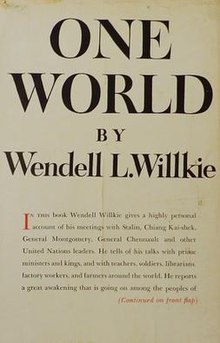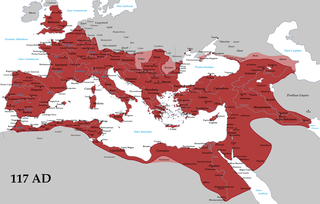
An empire is a political unit made up of several territories and peoples, "usually created by conquest, and divided between a dominant center and subordinate peripheries". The center of the empire exercises political control over the peripheries. Within an empire, different populations have different sets of rights and are governed differently. Narrowly defined, an empire is a sovereign state whose head of state is an emperor or empress; but not all states with aggregate territory under the rule of supreme authorities are called empires or are ruled by an emperor; nor have all self-described empires been accepted as such by contemporaries and historians.

Peace means societal friendship and harmony in the absence of hostility and violence. In a social sense, peace is commonly used to mean a lack of conflict and freedom from fear of violence between individuals or groups.

Wendell Lewis Willkie was an American lawyer, corporate executive and the 1940 Republican nominee for president. Willkie appealed to many convention delegates as the Republican field's only interventionist: although the U.S. remained neutral prior to Pearl Harbor, he favored greater U.S. involvement in World War II to support Britain and other Allies. His Democratic opponent, incumbent President Franklin D. Roosevelt, won the 1940 election with about 55% of the popular vote and took the electoral college vote by a wide margin.
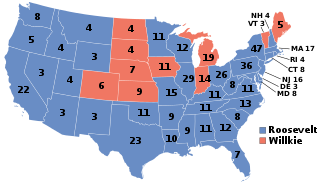
The 1940 United States presidential election was the 39th quadrennial presidential election. It was held on Tuesday, November 5, 1940. Incumbent Democratic President Franklin D. Roosevelt defeated Republican businessman Wendell Willkie to be reelected for an unprecedented third term in office. Until 1988, this was the last time in which the incumbent's party won three consecutive presidential elections.

Freedom House is a non-profit organization based in Washington, D.C., U.S. It is best known for political advocacy surrounding issues of democracy, political freedom, and human rights. Freedom House was founded in October 1941, with Wendell Willkie and Eleanor Roosevelt serving as its first honorary chairpersons. Its mission is to expand and defend freedom globally, and its vision is a world where all are free. Most of the organization's funding comes from the U.S. State Department and other government grants. It also receives funds from various semi-public and private foundations, as well as individual contributions.
World government is the concept of a single political authority with jurisdiction over all of Earth and humanity. It is conceived in a variety of forms, from tyrannical to democratic, which reflects its wide array of proponents and detractors.
The United States is a charter member of the United Nations and one of five permanent members of the UN Security Council.

Harold Clayton Urey was an American physical chemist whose pioneering work on isotopes earned him the Nobel Prize in Chemistry in 1934 for the discovery of deuterium. He played a significant role in the development of the atom bomb, as well as contributing to theories on the development of organic life from non-living matter.
The Baruch Plan was a proposal put forward by the United States government on 14 June 1946 to the United Nations Atomic Energy Commission (UNAEC) during its first meeting. Bernard Baruch wrote the bulk of the proposal, based on the March 1946 Acheson–Lilienthal Report. The Soviet Union, fearing the plan would preserve the American nuclear monopoly, declined in December 1946 in the United Nations Security Council to endorse Baruch's version of the proposal, and the Cold War phase of the nuclear arms race followed.

The surrender of the Empire of Japan in World War II was announced by Emperor Hirohito on 15 August and formally signed on 2 September 1945, bringing the war's hostilities to a close. By the end of July 1945, the Imperial Japanese Navy (IJN) had become incapable of conducting major operations and an Allied invasion of Japan was imminent. Together with the United Kingdom and China, the United States called for the unconditional surrender of the Japanese armed forces in the Potsdam Declaration on 26 July 1945—the alternative being "prompt and utter destruction". While publicly stating their intent to fight on to the bitter end, Japan's leaders were privately making entreaties to the publicly neutral Soviet Union to mediate peace on terms more favorable to the Japanese. While maintaining a sufficient level of diplomatic engagement with the Japanese to give them the impression they might be willing to mediate, the Soviets were covertly preparing to attack Japanese forces in Manchuria and Korea in fulfillment of promises they had secretly made to the United States and the United Kingdom at the Tehran and Yalta Conferences.
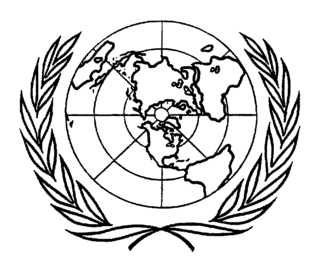
The United Nations Conference on International Organization (UNCIO), commonly known as the San Francisco Conference, was a convention of delegates from 50 Allied nations that took place from 25 April 1945 to 26 June 1945 in San Francisco, California, United States. At this convention, the delegates reviewed and rewrote the Dumbarton Oaks agreements of the previous year. The convention resulted in the creation of the United Nations Charter, which was opened for signature on 26 June, the last day of the conference. The conference was held at various locations, primarily the War Memorial Opera House, with the Charter being signed on 26 June at the Herbst Theatre in the Veterans Building, part of the Civic Center. A square adjacent to the Civic Center, called "UN Plaza", commemorates the conference.

The "Four Policemen" was a postwar council with the Big Four that US President Franklin Roosevelt proposed as a guarantor of world peace. Their members were called the Four Powers during World War II and were the four major Allies of World War II: the United Kingdom, the United States, the Soviet Union, and China. Roosevelt repeatedly used the term "Four Policemen" starting in 1942.
George N. Crocker was a United States Army officer, writer, lawyer, and businessman.
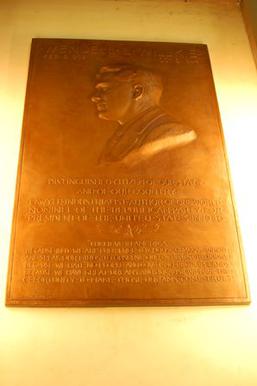
Wendell Willkie plaque is a public sculpture at the Indiana Statehouse in Indianapolis, Indiana, and was designed by American sculptor and educator Paul Fjelde. This bronze plaque honors Wendell L. Willkie (1892–1944) who was the Republican Party nominee for the U.S. presidency in 1940. The plaque was placed in the Statehouse rotunda on February 18, 1950. The inscription on the bottom of the plaque was taken from Willkie's book "One World" which calls for unified world order.
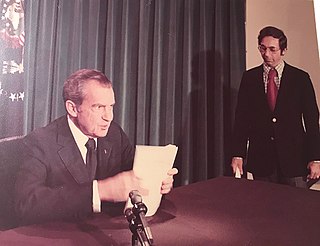
President Richard Nixon made an address to the American public from the Oval Office on August 8, 1974, to announce his resignation from the presidency due to the Watergate scandal.
The War Book Panel was created in 1942 during World War II by the Council on Books in Wartime to recommend books to the public that would assist in the goals of the war effort.
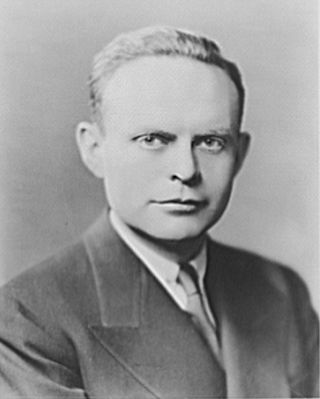
Gardner "Mike" Cowles Jr. (1903–1985) was an American newspaper and magazine publisher. He was co-owner of the Cowles Media Company, whose assets included the Minneapolis Star, the Minneapolis Tribune, the Des Moines Register, Look magazine, and a half-interest in Harper's Magazine.

The third presidential term of Franklin D. Roosevelt began on January 20, 1941, when he was once again inaugurated as the 32nd president of the United States, and the fourth term of his presidency ended with his death on April 12, 1945. Roosevelt won a third term by defeating Republican nominee Wendell Willkie in the 1940 United States presidential election. He remains the only president to serve for more than two terms. Unlike his first two terms, Roosevelt's third and fourth terms were dominated by foreign policy concerns, as the United States became involved in World War II in December 1941.
World federalism or global federalism is a political ideology advocating a democratic, federal world government. A world federation would have authority on issues of global reach, while the members of such a federation would retain authority over local and national issues. The overall sovereignty over the world population would largely reside in the federal government.
